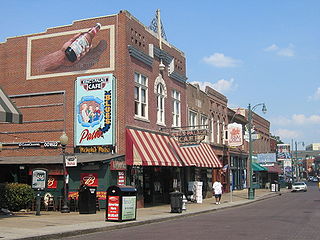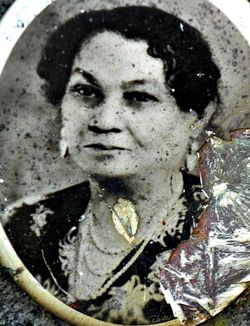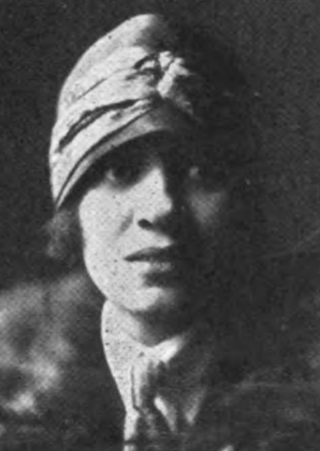Related Research Articles

Memphis is a city in the U.S. state of Tennessee. It is the seat of Shelby County, in the southwesternmost part of the state, and is situated along the Mississippi River. With a population of 633,104 at the 2020 U.S. census, Memphis is the second-most populous city in Tennessee after Nashville.

Ida Bell Wells-Barnett was an American investigative journalist, educator, and early leader in the civil rights movement. She was one of the founders of the National Association for the Advancement of Colored People (NAACP). Wells dedicated her career to combating prejudice and violence, and advocating for African-American equality—especially that of women.

Beale Street is a street in Downtown Memphis, Tennessee, which runs from the Mississippi River to East Street, a distance of approximately 1.8 miles (2.9 km). It is a significant location in the city's history, as well as in the history of blues music. Today, the blues clubs and restaurants that line Beale Street are major tourist attractions in Memphis. Festivals and outdoor concerts frequently bring large crowds to the street and its surrounding areas.

Benjamin Lawson Hooks was an American civil rights leader and government official. A Baptist minister and practicing attorney, he served as executive director of the National Association for the Advancement of Colored People (NAACP) from 1977 to 1992.
WDIA is a radio station based in Memphis, Tennessee. Active since 1947, it soon became the first radio station in the United States that was programmed entirely for African Americans. It featured black radio personalities; its success in building an audience attracted radio advertisers suddenly aware of a "new" market among black listeners. The station had a strong influence on music, hiring musicians early in their careers, and playing their music to an audience that reached through the Mississippi Delta to the Gulf Coast.
If Beale Street Could Talk is a 1974 novel by American writer James Baldwin. His fifth novel, it is a love story set in Harlem in the early 1970s. The title is a reference to the 1916 W.C. Handy blues song "Beale Street Blues", named after Beale Street in Downtown Memphis, Tennessee.

The history of Memphis, Tennessee and its area began many thousands of years ago with succeeding cultures of indigenous peoples. In the first millennium, it was settled by the Mississippian culture. The Chickasaw Indian tribe emerged about the 17th century, or migrated into the area. The earliest European exploration may have encountered remnants of the Mississippian culture by Spanish explorer Hernando de Soto. Later French explorers led by René-Robert Cavelier, Sieur de La Salle likely encountered the Chickasaw. The city of Memphis was not founded until 1819. The city was named after the ancient capital of Egypt on the Nile River in North Africa.
Ell Persons was a black man who was lynched on 22 May 1917, after he was accused of having raped and decapitated a 15-year-old white girl, Antoinette Rappel, in Memphis, Tennessee, United States. He was arrested and was awaiting trial when he was captured by a lynch party, who burned him alive and scattered his remains around town, throwing his head at a group of African Americans. A large crowd attended his lynching, which had the atmosphere of a carnival. No one was charged as a result of the lynching, which was described as one of the most vicious in American history, but it did play a part in the foundation of the Memphis chapter of the NAACP.
Julia Britton Hooks, known as the "Angel of Beale Street," was a musician and educator whose work with youth, the elderly, and the indigent was highly respected in her family's home state of Kentucky and in Memphis, Tennessee, where she lived with her second husband, Charles F. Hooks. She was a charter member of the Memphis branch of the National Association for the Advancement of Colored People (NAACP), and her example served as an inspiration for her grandson, Benjamin Hooks, executive director of the NAACP from 1977 to 1992. Julia was also a leader for African-American women and active in the civil rights movement.

Beebe Steven Lynk (1872–1948) served as the professor of medical Latin botany and materia medica at the University of West Tennessee. She was an active member of the early black women's club movement, authoring a book, Advice to Colored Women in 1896.

Raumesh Aleza Akbari is an American politician and member of the Tennessee Senate for the 29th district since 2019. She was formerly a member of the Tennessee House of Representatives for the 91st district. She currently serves as First Vice Chair of the Education Committee, and a member of the Commerce and Labor Committee, and the Ethics Subcommittee. She is a member of the Democratic Party.

Georgia E. Lee Patton Washington was an American missionary and physician. Following her education, she served as a medical missionary in Liberia. She was the first black woman to become a licensed surgeon and physician in Tennessee.
Robert Reed Church Jr. was a prominent businessman and Republican Party organizer in Memphis, Tennessee. His father was the successful businessman Robert Reed Church, and Church Jr. succeeded his father as president of the Solvent Savings Bank and Trust Company after his father's death. An African American, he organized the first NAACP branch in Tennessee and was a member of the NAACP national board of directors. From the 1910s to 1940s, he was one of the most powerful political figures in his hometown of Memphis. Forced to leave Memphis because of harassment by Democratic boss E. H. Crump, Church moved to Washington, D.C., in 1940.
Nathaniel Dowd Williams, known as Nat D. Williams or simply Nat D., was an American high school teacher, disc jockey on Black Appeal radio, journalist and editor. He was born on Beale Street in Memphis, Tennessee. Known for his jive patter on the air, Williams had 10% of African-Americans in the U.S. listening to his program and heralded the changing radio style which helped to create "Black appeal radio", which it turn led to the urban contemporary listening format of Black radio in the 1960s and '70s.
James P. Newton was a photographer in Memphis, Tennessee. He is noted as the city's first African American professional photographer and as an influential documenter of the city's history. Several of his cabinet card photographs remain including in the University of Memphis' collection.

Lillian Atkins Clark was an American physician. She was the first African American woman to pass the National Board of Medical Examiners. She worked as a medical doctor in Philadelphia in hospitals and in her own practice.
The Memphis Free Speech was an African American newspaper founded in 1881 in Memphis, Tennessee, by the Reverend Taylor Nightingale, based at the Beale Street Baptist Church. In 1888 the publication's name was changed to the Memphis Free Speech and Headlight when Nightingale was joined by J. L. Fleming, a newspaperman from Crittenden County, Arkansas, who had previously edited the Marion Headlight "until a white mob 'liberated' the county from black rule and ran him out of town." The following year Ida B. Wells was invited to contribute to the paper but declined to do so unless she was an equal partner, so with the agreement of Nightingale and Fleming she bought a one-third interest, becoming the editor while Fleming was the business manager and Nightingale the sales manager.

Mary Jane Richardson Jones was an American abolitionist, philanthropist, and suffragist. Born in Tennessee to free African-American parents, Jones and her family moved to Illinois. With her husband, John, she was a leading African-American figure in the early history of Chicago. The Jones household was a stop on the Underground Railroad and a center of abolitionist activity in the pre-Civil War era, helping hundreds of fugitive slaves flee slavery.
References
- 1 2 3 Lowry, Joe (2018-09-26). "Dr. Francis Kneeland – Forgotten Hero". Our Memphis History. Archived from the original on 23 February 2020. Retrieved 2020-02-23.
- 1 2 3 4 5 6 Jenkins, Earnestine (1997). "Kneeland, Francis M.". In Hine, Darlene Clark; Thompson, Kathleen (eds.). Black Women in America: Science, Health, and Medicine. Vol. 11. New York: Facts on File, Inc. pp. 94–95. ISBN 0-8160-3425-7. OCLC 35209436.
- 1 2 Hamilton, Green Polonius (1908). The Bright Side of Memphis: A Compendium of Information Concerning the Colored People of Memphis, Tennessee, Showing Their Achievements in Business, Industrial and Professional Life and Including Articles of General Interest on the Race. Memphis, Tennessee. p. 40. OCLC 17372229.
{{cite book}}: CS1 maint: location missing publisher (link) - ↑ "Early Twentieth Century Memphis". The University of Memphis. Retrieved 2020-02-28.
- ↑ Jenkins, Earnestine Lovelle (2009). African Americans in Memphis. Charleston, South Carolina: Arcadia Publishing. ISBN 978-1-4396-2271-1.
- ↑ "Baptist Women Meet". The Tennessean. 1902-07-18. p. 2. Retrieved 2020-02-26– via Newspapers.com.
- ↑ "Mayor Bass Welcomes Negro Baptists to City". Chattanooga Daily Times. 24 October 1929. Retrieved 25 February 2020– via Newspapers.com.